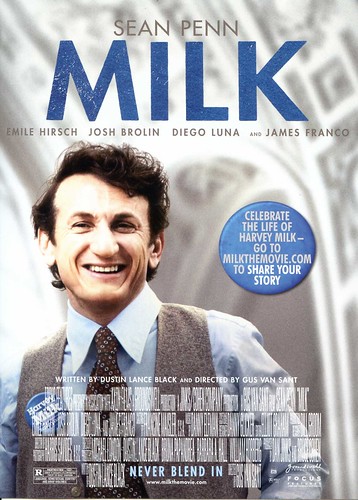 “Milk,” Gus Van Sant’s chronicling of Harvey Milk’s (Sean Penn) political career as California’s first openly gay elected official is an important and relevant movie that addresses the still prickly issue of gay rights.
“Milk,” Gus Van Sant’s chronicling of Harvey Milk’s (Sean Penn) political career as California’s first openly gay elected official is an important and relevant movie that addresses the still prickly issue of gay rights.In 1978, Milk fought against Prop 6, a law that would have made firing gay teachers and any public school employees who supported gay rights mandatory. Thirty years later it was Prop 8, a rewrite to California’s state constitution defining marriage as between members of the opposite sex, that gay right’s activists had to contend with. Milk won his vote; the same can’t be said of the Prop 8 vote last November.
The re-creations of Milk’s speeches and debates bring the issue down to its most base level: human rights. Milk’s message, the man and film, was simply that gays be given the same rights as everyone else.
This is a bio-pic, but one that focuses in on Milk’s rise as a politician and leading up to his assassination. We learn little about Milk’s life before he moved from New York to San Francisco. Too often bio-pics become overly muddled with childhood flashbacks, “Milk” side steps this entirely. It is implied that his pre-California life was a repressed one full of tragedy, and we are told enough to understand his drive to fight for gay rights.
Van Sant, working from a screenplay by Dustin Lance Black (HBO’s “Big Love”), delivers a film that seamlessly blends archival footage with re-creations and traditional narrative filmmaking.
Black’s script captures Milk’s humor and compassion in a way that never feels condescending or contrived. Black addresses the film’s issues in a way that is not heavy hand. This is commendably not an exploitive or manipulative piece of propaganda, although I’m sure some will accuse it of that.
As a director, Van Sant has balanced more mainstream work like “Good Will Hunting” and “Finding Forrester” with indie films such as “Elephant” and “Last Days.” “Milk” is his most accessible, broadly appealing film in nearly a decade. It is like he has taken everything has learned from his experimental films and applied it here.
Although Penn, per usual, gives a strong, layered performance, this is not entirely his show. He is surrounded by one of the stronger ensemble casts of 2008,and there are several standout performances.
James Franco gives a nuanced performance (“Pineapple Express”) as Milk’s boyfriend who struggles with sharing him with his political career following several failed attempts to be elected supervisor. Franco, after being stuck playing second fiddle to Tobey Maguire in the “Spider-Man” movies, really came into his own as an actor in 2008.
Emile Hirsh (“Into the Wild”) has a memorably flamboyant energy as Cleve Jones, a member of Milk’s campaign staff. Alison Pill (“Dan in Real Life”) as the one lesbian of the staff brings a hard edge and biting wit. The key to all these performances is that actors aren’t simply “acting gay,” but creating full performances that never slip into broad stereotypes.
Josh Brolin (“W.”) as Dan White, one of Milk’s fellow supervisors, with whom he often comes into conflict, has one of the less showy roles in the film, but he gives a compelling, conflicted performance. Milk and White’s relationship is an uneasy one that takes a tragic turn.
The film’s final scenes are deeply powerful and moving, and would be standing on their own, but they are all the more so because the film has done such a beautiful job creating a portrait of Milk and of his movement.

No comments:
Post a Comment